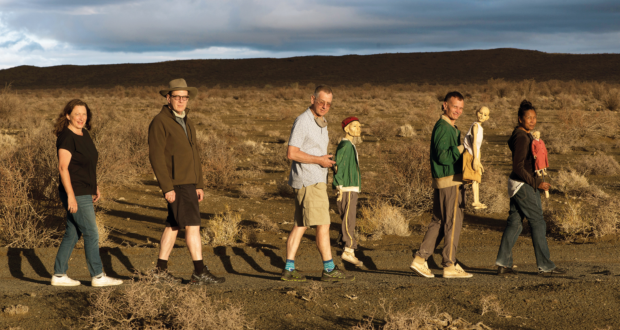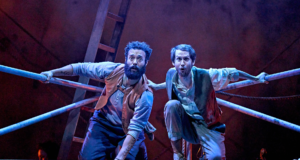Handspring Puppet Company’s Adrian Kohler and Basil Jones on Life & Times of Michael K
I have to say my heart skipped a beat when I heard that Baxter Theatre are bringing Life & Times of Michael K from South Africa to the Edinburgh Fringe Festival this summer. This epic production is created in conjunction with the Tony award-winning, globally revered Handspring Puppet Company, who you will surely know from their astonishing work on War Horse and Little Amal. Adapted and directed by Lara Foot, it is based on the novel by Nobel Prize-winning South African author JM Coetzee. Could it sound more fabulous?
And now I’m hugely over-excited and fan-girling as we get to chat with the iconic Adrian Kohler and Basil Jones, Co-founders of Handspring, and ask them a bit about the production.


Adrian, Basil – thank you so very much for taking the time to chat with us. Your work has, in my opinion, caused a fundamental shift in the way puppetry is perceived, enabling new ways to imaginatively interact with stories, so I’m fascinated to see what it can achieve in this adaptation of JM Coetzee’s outstanding novel. Can you tell us a bit about the story to begin with?
It’s a story about an exquisitely simple man who so adores his ailing mother that he’s prepared to ignore the civil war raging around him to take her – by wheelbarrow – to spend her last days in a rural birthplace.
Your partnership working with Lara Foot sounds really exciting. How does it feel bringing a collaboration of such strong, authentic South African talents to Europe?
We first worked with Lara on Handspring’s production of Starbrites devised with Barney Simon at the Market Theatre in Johannesburg 30 years ago. Ever since we’ve been promising that we’ll work together again. We relish this as our first opportunity.
And for an equal number of years, we’ve been trying to do a theatrical version of one of John Coetzee’s novels.
On both counts: THIS IS IT.
The Michael K ensemble of puppeteers and actors is one of the most stellar casts we’ve ever worked with. Many are household names in our country. Craig Leo, main manipulator of Michael, is one of the world’s leading puppeteers, in demand globally. His work is a marvel to witness.
Coetzee’s writing can be profoundly visceral and affecting. How are you able to articulate his very corporeal depiction of humanity, as Michael seeks his human purpose, using puppets: non-living objects?
From the dawn of time, humans believed in the life of things, of mountains, of storms, of oceans. This animism is still latent in us. The joy of seeing an object being given life plays an important part in our childhoods. I’ve [Basil] said: “Puppets always have to strive to be alive; they literally embody our desperation to live”. This is at the root of the performance, which combines two titanic wills: the will of the three puppeteers to give life to Michael and the will of the audience to be witness to a miracle – to see an object coming to life before their eyes.
Can you tell us about if and how the properties and design of the main puppet reflect Michael’s distinctive physicality, and how it might affect audience responses?
In the book Coetzee tells us that Michael has an unreconstructed hare lip. One reads this and more or less forgets about it. On stage that hare lip is present all the time. Adrian’s big design challenge was how to carve a disfigured face which retains its human poetry and dignity. Another challenge was how to design a puppet that can sometimes be naked on stage with sangfroid. Being the designer that he is, I think audiences are agreeing that he has risen to both challenges.
What can we look forward to from the puppeteers and other cast?
Absolute mastery is what this cast delivers on stage. When everyone is working together they move into a state of trance, where everyone is breathing together and super-sensitive to what each performer is doing and where they are on stage. This we term ‘group mind’. It’s a form of theatrical superconductivity.
This is the simple story of a very ordinary man. What visual and sound elements can we expect on stage to complement the puppetry and give Michael’s tale significance?
The music for this show is by Kyle Shepherd, one of South Africa’s leading progressive pianists, composers and band leaders. His minimalist music has a sacred quality, reminiscent of the Lithuanian composer, Arvo Pärt. And Simon Kohler’s lyrical soundscapes add to our sense of timelessness on Michael’s journey under the stars.
The play is set in the apartheid era of the 1970s/80s. Is this a story about race, or more than that? And why is it relevant now?
It’s not about race, though race is always part of the background radiation in South Africa. This is a play about how each of us is challenged to live an authentic life, to connect with nature and with plants. Michael K is a prophet, who, before everything, wants to be a gardener. He abjures all conflict, seeking nothing more than to grow his own food. Surely this is an essential message for our time.
Thank you so much for taking the time to tell us about this fascinating production, which is going to be an extraordinary addition to this year’s Fringe.
JM Coetzee’s Life & Times of Michael K runs at the Assembly Hall – Main Hall on August 3-13, 15-20, 22-27 as part of the Edinburgh Fringe Festival. Further information and bookings can be found here.
 Everything Theatre Reviews, interviews and news for theatre lovers, London and beyond
Everything Theatre Reviews, interviews and news for theatre lovers, London and beyond





One comment
Pingback: Review: JM Coetzee's Life & Times of Michael K, EdFringe - Everything Theatre